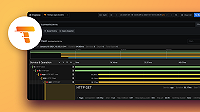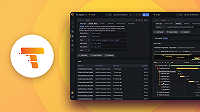This is documentation for the next version of Grafana Tempo documentation. For the latest stable release, go to the latest version.
Monolithic deployment
The TempoMonolithic Custom Resource (CR) creates a Tempo deployment in
Monolithic mode.
In this mode, a single container has all components of the Tempo deployment, including the compactor, distributor, ingester, querier, and query-frontend.
This type of deployment is ideal for small deployments, demo, and test setups, and supports storing traces in memory, in a Persistent Volume and in object storage.
Note
The monolithic deployment of Tempo doesn’t scale horizontally. If you require horizontal scaling, use the
TempoStackCR for a Tempo deployment in Microservices mode.
Quickstart
The following manifest creates a Tempo monolithic deployment with trace ingestion over OTLP/gRPC and OTLP/HTTP, storing traces in a 2 GiB tmpfs volume (in-memory storage).
apiVersion: tempo.grafana.com/v1alpha1
kind: TempoMonolithic
metadata:
name: sample
spec:
storage:
traces:
backend: memory
size: 2GiAfter the Pod is ready, you can send traces to tempo-sample:4317 (OTLP/gRPC) and tempo-sample:4318 (OTLP/HTTP) inside the cluster.
To configure a Grafana data source, use the URL http://tempo-sample:3200 (available inside the cluster).
CRD specification
A manifest with all available configuration options is available here: tempo.grafana.com_tempomonolithics.yaml.
Note
This file is auto-generated and does not constitute a valid CR.
It provides an overview of the structure, the available configuration options and help texts.


